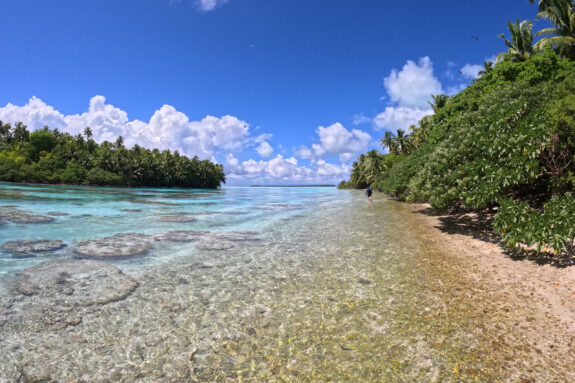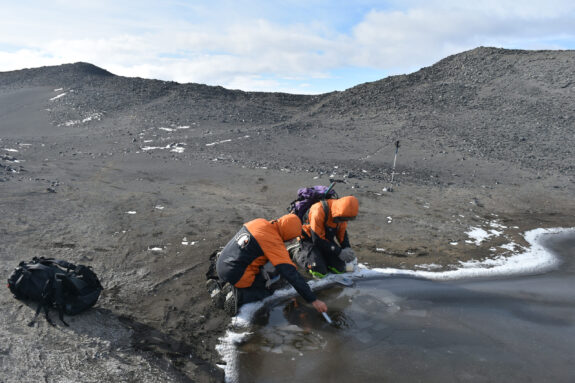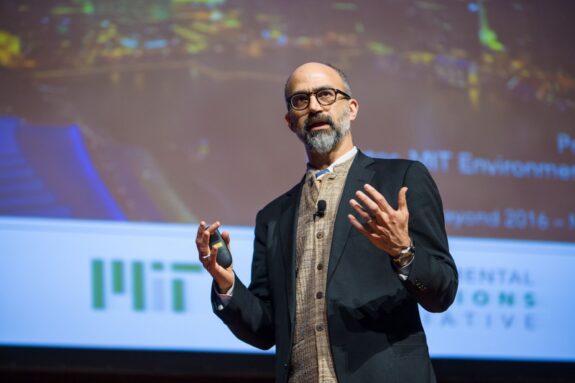The Office of the Vice Chancellor and the Registrar’s Office have announced the 2022 Margaret MacVicar Faculty Fellows, including EAPS professor of earth, atmospheric and planetary sciences W. David McGee. Also honored this year are: Kenneth Kamrin, professor of mechanical engineering; Jeffrey Lang, professor of electrical engineering and computer science; and Matthew Shoulders, professor of chemistry .
For 30 years, the MIT provost has recognized exemplary and sustained contributions to undergraduate education at MIT. The MacVicar Faculty Fellows program was named after Margaret MacVicar, the first dean for undergraduate education and founder of the Undergraduate Research Opportunities Program (UROP). Departments submit nominations and the selection process is highly competitive. Award recipients are appointed to a 10-year term and receive $10,000 per year of discretionary funds. Junior faculty are eligible for an initial three-year term, and the appointment can be converted to a 10-year fellowship if tenure is granted.
The 2022 Fellows join an elite academy of scholars who are committed to academic innovation and enhancing the student experience through teaching, leadership, mentoring, and advising.
Kamrin, Lang, McGee, and Shoulders’ exceptional instruction, improvements to curricula, and meaningful connections with undergraduates have had a significant impact on their departments, their students, and the Institute as a whole.
Kenneth Kamrin
“What an honor it is to be selected and to join such amazing company!” Kenneth Kamrin, professor of mechanical engineering says of becoming a MacVicar Fellow.
Kamrin received his PhD from MIT in 2008 and joined the mechanical engineering department in 2011. Shortly thereafter, he was appointed the Class of 1956 Career Development Chair and became an associate professor in 2016.
What sets Kamrin apart are his connections with students and the transformative impact he’s had on his department and undergraduate education at MIT.
Kamrin has taught two core mechanics classes, 2.001 and 2.002 (Mechanics and Materials I & II), and his teaching assistant Jeremy McCulloch ’22 reflects on the ways he helped students tackle some of the most fundamental topics in mechanical engineering. “He focused on addressing any questions or misunderstandings that students had. This made recitation more engaging and allowed [students] to focus on the material that was most difficult for them.”
McCulloch goes on to praise Kamrin’s special ability to guide students to discover new concepts on their own. “By providing them with just the right hints, he helps them learn the necessary material while still having an ‘aha’ moment that helps them gain a deeper understanding.”
Kamrin further demonstrates his belief in a growth mindset with his 2.002 bootcamp. Introduced in the spring of 2021, the bootcamp proved that students in upper-level classes can receive just as much benefit from customized mentoring and prep sessions as those in 2.001.
Assistant professor of mechanical engineering Carlos M. Portela writes, “Ken has been able to shape [2.002] into a beautifully organized sequence of concepts: a ‘knowledge tree’ consisting of a ‘trunk’ of fundamental concepts (followed by a handful of ‘branch’ topics, which stem from the trunk) and a searchable concept database.”
One Course 2 alumnus reflects, “After having completed 2.001 through 2.006, I can say with certainty that 2.002 is the class I understand best, even after a year and a half of having completed it, and I attribute it to Professor Kamrin’s attention to rigorous thinking.”
Kamrin is known for his engaging lectures and ability to captivate an audience. Last year, a department video titled the “Nature of Sand” caught the attention of National Geographic, the editors of which subsequently invited him to narrate a new television series called “Superstructures: Engineering Marvels.”
Quentin Berg Professor of Mechanics and MacVicar Fellow Rohan Abeyeratne concurs: “Ken is a master story-teller. He inspires the class by relating highly relevant anecdotes about applications, both historical and modern.”
Kamrin is also an innovator in the realm of digital education. Kamrin and fellow mechanical engineering professor Pedro Reis, led an experiment in the use of educational technology to alleviate student scheduling issues prior to the establishment of MITx. Their work highlighted the positive correlation between online learning and residential education and set the stage for the expansion of digital education across MIT.
From 2013-2020, Kamrin served as a UROP coordinator for mechanical engineering and is currently his department’s representative on the board of the MIT New Engineering Education Transformation (NEET) program. In 2021, he was appointed Undergraduate Officer and chair of its Undergraduate Programs Committee. In these important roles he helped to address the Covid-19 related stresses and hardships faced by underrepresented minority students and first-year students.
Kamrin writes, “My own undergraduate experience holds a special place in my heart, so I am especially honored to receive this award. At MIT, we are lucky to have such amazing students, who make the process of teaching even more fun.”
Jeffrey Lang
“When I first came to MIT as a student, I never envisioned teaching as part of my future career,” says Jeffrey Lang, professor of electrical engineering and computer science. “MIT is filled with exceptional educators from whom I have learned much along the way; to join them now as a MacVicar Fellow is a tremendous honor.”
Lang received his BS, MS, and PhD degrees from MIT’s department of electrical engineering and computer science. He joined Course 6 in electrical engineering in 1980, was named Vitesse Professor in 2013, and was awarded the Harold E. Edgerton Award in 1986 and the Graduate Student Council Teaching Award in 1987.
Over the past four decades Lang’s name has become synonymous with curricular innovation across EECS. Rajeev Ram, professor of electrical engineering and computer science and MacVicar Faculty Fellow says, “He has contributed to re-developing the heart of electrical engineering (circuits and electromagnetism) on 3 separate occasions. These three waves of curricular development have taken place over 22 years with Jeff playing key leadership roles.”
Tomás Palacios, professor of electrical engineering and computer science called Lang “a leader in the overall curriculum development in electrical engineering” and “one of the most active contributors” to the Course 6 redevelopment process.
One of Lang’s key contributions is in teaching 6.002 (Circuits and Electronics), a foundational subject in the electrical engineering curriculum. It was modernized in 2000 and spawned the textbook, “Foundations of Analog and Digital Electronic Circuits,” co-authored with the director of CSAIL, Anant Agarwal. Later, the subject became one of the very first edX classes, which has since reached more than 150,000 students in 133 countries worldwide.
Lang has also taught the core electromagnetics classes 6.013 and 6.014, and was responsible for creating hands-on laboratories for the modern circuits class, which allowed students to engage more directly with the course material.
Students say that his classes are challenging, yet inclusive and approachable. Junior Nina Gerszberg wrote, “Professor Lang is an amazing teacher due to his ability to take a complex subject and break it down into clear and engaging explanations…the fact that [he] is so passionate about circuits and electronics, made it easier for me to also get excited about the material too.”
Brooke McGoldrick ’20, MNG ’21, a mechanical engineering alumna, notes: “6.014 stands out as one of the most enjoyable courses from my undergraduate career. Following each demonstration, Professor Lang would concisely summarize the physical principles at work…[and] effectively connected the experiment to the concepts taught in lecture.”
Like his work on curricular reform, Lang’s tailor-made lectures provide students with uniquely enriching learning experiences. Karl K. Berggren, professor of electrical engineering, says that his classes are “meticulously crafted and organized, and invariably include meaningful laboratory experience (designed by him personally) with curricula that complement and strengthen the course.”
Beyond the classroom, Jeffrey Lang goes the extra mile for students and colleagues. Junior Nikita Romanov notes, “The first time I met Professor Lang…I was amazed by [his] enthusiasm in educating and mentoring people from the MIT community.”
Palacios shares a similar sentiment. “In addition to his technical mastery of the subjects… Professor Lang continuously inspires all of us with his kindness and attention to our students. He is extremely generous with his time, and always makes a point to help students whenever they need [it].”
W. David McGee
W. David McGee is associate professor with tenure in the Department of Earth, Atmospheric and Planetary Sciences (EAPS), Course 12. He holds a PhD in earth and environmental sciences from Columbia University, an MS in earth and environmental sciences from Tulane University, and an MA in teaching from Chatham College. He joined MIT in 2012 and became director of Terrascope — an innovative community for first-year learning and advising — in 2015.
McGee’s research addresses sustainability and its lasting implications on the environment and global ecosystem, which is at the heart of Terrascope’s mission. What is perhaps most noteworthy about his teaching is the way he helps students combine scientific principles with ethics and social awareness to take on the planet’s biggest issues both at home and abroad.
Department head and Schlumberger Professor of Earth and Planetary Sciences Robert van der Hilst notes, “David is reimagining MIT undergraduate education to include meaningful collaborations with communities outside of MIT, teaching students that scientific innovation is not enough.”
McGee oversees the cornerstone of the Terrascope program: 12.000 (Solving Complex Problems). Students work in teams to develop solutions and technologies for real-world, environmental issues and present them to a panel of experts. Spring break trips enable the students to experience their solutions firsthand in the communities they affect.
Van der Hilst continues, “David’s exemplary teaching in Terrascope comes through his refreshing perspective of our planetary situation through the foundations of science and how solutions must be formulated through the intersection of science with ethical paths forward informed by community engagement.”
J. Taylor Perron, associate department head and Professor of Geology in EAPS commented that McGee’s directorship has been transformative and that many “undergraduates consider Terrascope to be a pillar of environmental thought and education at MIT.”
McGee is also the associate department head for diversity, equity, and inclusion (DEI) in EAPS and is responsible for creating a roadmap for positive systemic change. He additionally collaborates with students in the department to support and advance “Unlearning Racism in Geoscience,” a nationwide initiative by the American Geophysical Union focused on creating more equitable practices and policies within the realm of geoscience.
Notably, McGee encourages students to challenge the status quo. Ari Epstein, associate director of Terrascope says, “Students who have had the good fortune to be educated by Professor McGee learn to look beyond the conventional paths…They learn the rare combination of humility and boldness that drives real change.”
Kate Trimble, senior associate dean and director of Office of Experiential Learning (OEL) wrote that McGee’s unique approach is based on the belief that “lessons about empathy, humility, respect, and cultural differences … are important for students to learn early in their MIT careers.” He employs “a big-tent approach that gives everyone a seat at the table.”
McGee is also a committed mentor and UROP advisor and supervises undergraduate senior theses. He received the Excellence in Mentoring Award in 2018.
A Terrascope alumnus wrote, “My experiences in Terrascope and interactions with David were among the most valuable of my time at MIT. My education would not have been nearly as well-rounded or as human without his leadership.” Another remarks, “David…does a phenomenal job forging genuine relationships and making sure that students feel both noticed and encouraged.”
On receiving this award, McGee is full of gratitude. “Being named a MacVicar Faculty Fellow is an incredible honor. I’m grateful for the amazing colleagues and students who continually support and inspire me in developing as a teacher.”
Matthew Shoulders
Matthew Shoulders is associate professor of chemistry and an associate member at the Broad Institute of MIT and Harvard. He received his undergraduate degree from Virginia Tech and a PhD in organic chemistry from the University of Wisconsin at Madison. Following a postdoc as an American Cancer Society Fellow at the Scripps Research Institute, Shoulders joined MIT in 2012 and became associate professor with tenure in 2019.
Mentorship is at the center of Matthew Shoulders’ approach to teaching. Troy Van Voorhis, professor of chemistry and department head remarked, “In his 9 years at MIT, Matt has supervised 25 UROP students!That number is a testament to both his excellence as a mentor — it is his outstanding reputation among the undergraduates that bring UROPs to his group year in and year out — and also a testament to his dedication.”
Rachel Weissman ’21 wrote, “Beyond technical training, he mentors his undergraduates to become critical and analytical scientists…He always makes time to check in with students and understand their career and post-graduation goals so he can help them succeed.”
Shoulders has taught 5.111 (Principles of Chemical Science), 5.302 (Introduction to Experimental Chemistry), and has contributed to two edX classes in his department. His work on 5.111 through the edX platform served to address gaps in the classroom curriculum by providing online tools to help students better grasp the material.
To add to his long list of contributions, Shoulders also runs a 5.111 “bootcamp” which includes videos, tutorials, and practice problems to assist first-year students – particularly those who may not have taken AP chemistry in high school – in mastering some of the most challenging concepts of the GIR.
Van Voorhis continues, “Matt is someone who is willing to go above and beyond… [he] is beloved by the undergrads of MIT and with good reason.”
With everything he does, Shoulders brings a passion for chemistry and a genuine desire to introduce more students to it. One of his former students remarked, “He struck a very good balance between preparing us sufficiently for exams while still making lectures engaging and connecting them to the real world. I originally came in as a math major, and how much I enjoyed 5.111 definitely contributed to my switch to chemistry!”
Sylvia T. Ceyer, the John C. Sheehan Professor of Chemistry and MacVicar Faculty Fellow says, “Matt is extraordinarily talented … his cheerful willingness to take on additional educational tasks … coupled with his capacity to galvanize the students’ interest in learning and research … makes him a really special educator and mentor who radiates the very best.”
Junior Pedro Colón wrote, “It is committed professors like Professor Shoulders that make being an undergraduate student at MIT worthwhile and a notable part of my own life.”
On being named a 2022 fellow, Shoulders says, “I am tremendously honored and humbled … I am constantly inspired by the amazing scholars and students I get to work with here every day, and I am deeply grateful for the opportunity to keep learning from and contributing to this community.”



